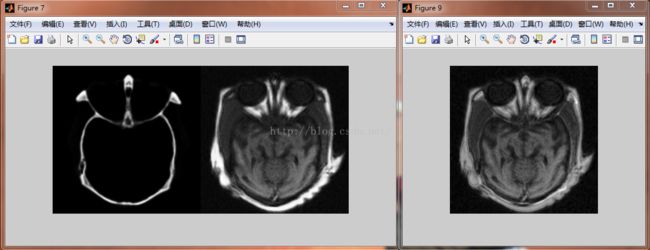基于L0边缘保持滤波的图像融合 matlab代码
本文程序是根据"Zhao J, Feng H, Xu Z, et al. Detail enhanced multi-source fusion using visual weight map extraction based on multi scale edge preserving decomposition[J]. Optics Communications, 2013, 287: 45-52."编写的,最大的问题是运行时间太长了,有五六分钟,还有就是最后的融合效果并不是很理想。
具体matlab程序为:
clear all;
%path_A = '..\IR and Vis\Camp_Vis.jpg'; path_B = '..\IR and Vis\Camp_IR.jpg';
%path_A = '..\IR and Vis\Dune_Vis.jpg'; path_B = '..\IR and Vis\Dune_IR.jpg';
path_A = '..\Medical Images\source1_1.tif'; path_B = '..\Medical Images\source1_2.tif';
img1 = double(imread(path_A))/255.0;
img2 = double(imread(path_B))/255.0;
if(size(img1,3)~=1)
img1=rgb2gray(img1);
end
if(size(img2,3)~=1)
img2=rgb2gray(img2);
end
%% ---------- L0 Decomposition --------------
nLevel = 3;
lambda=[0.0005 0.003 0.018];
f1 = cell(1, nLevel+1);
d1 = cell(1, nLevel+1);
f1{1}=img1;
for L = 2:nLevel+1,
f1{L} = L0Smoothing(f1{L-1},lambda(L-1));
d1{L} = f1{L-1} - f1{L};
end
% figure;imshow([mat2gray(f1{2}),mat2gray(f1{3}),mat2gray(f1{4});...
% mat2gray(d1{2}),mat2gray(d1{3}),mat2gray(d1{4})]);
f2 = cell(1, nLevel+1);
d2 = cell(1,nLevel+1);
f2{1}=img2;
for L = 2:nLevel+1,
f2{L} = L0Smoothing(f2{L-1},lambda(L-1));
d2{L} = f2{L-1} - f2{L};
end
% figure;imshow([mat2gray(f2{2}),mat2gray(f2{3}),mat2gray(f2{4});...
% mat2gray(d2{2}),mat2gray(d2{3}),mat2gray(d2{4})]);
%% ---------- Visual Weight Map(VWM) --------------
V_d1 = cell(1,nLevel+1);
V_d2 = cell(1,nLevel+1);
V_f1=zeros(size(img1));
V_f2=zeros(size(img2));
%VWM of img1 detail layer
for L = 2:nLevel+1,
V_d1{L}=zeros(size(img1));
img1_detail=uint8(mat2gray(d1{L})*255);
for j=0:255,
for i=0:255,
V_d1{L}(img1_detail==j)=V_d1{L}(img1_detail==j)+length(find(img1_detail==i))*abs(j-i);
end
end
V_d1{L}=mat2gray(V_d1{L});
end
%VWM of img2 detail layer
for L = 2:nLevel+1,
V_d2{L}=zeros(size(img2));
img2_detail=uint8(mat2gray(d2{L})*255);
for j=0:255,
for i=0:255,
V_d2{L}(img2_detail==j)=V_d2{L}(img2_detail==j)+length(find(img2_detail==i))*abs(j-i);
end
end
V_d2{L}=mat2gray(V_d2{L});
end
%VWM of img1 base layer
img1_base=uint8(255*f1{nLevel+1});
for j=0:255,
for i=0:255,
V_f1(img1_base==j)=V_f1(img1_base==j)+length(find(img1_base==i))*abs(j-i);
end
end
V_f1=mat2gray(V_f1);
%VWM of img2 base layer
img2_base=uint8(255*f2{nLevel+1});
for j=0:255,
for i=0:255,
V_f2(img2_base==j)=V_f2(img2_base==j)+length(find(img2_base==i))*abs(j-i);
end
end
V_f2=mat2gray(V_f2);
% figure;imshow(V_f2);
%% ---------- Multi-scale Combination --------------
% base layer combination
F_base=0.5*((f1{nLevel+1}.*V_f1+f2{nLevel+1}.*(1-V_f1))+(f1{nLevel+1}.*V_f2+f2{nLevel+1}.*(1-V_f2)));
% detail layer combination
F=cell(1,nLevel+1);
for L = 2:nLevel+1,
F{L}=0.5*((d1{L}.*V_d1{L}+d2{L}.*(1-V_d1{L}))+(d1{L}.*V_d2{L}+d2{L}.*(1-V_d2{L})));
end
%% ---------- Fusion Result --------------
beta=[0.8 0.6 0.6 0.5];
F_out=zeros(size(img1));
for L = 2:nLevel+1,
F_out=F_out+beta(L-1)*F{L};
if L==nLevel+1,
F_out=F_out+beta(L)*F_base;
end
end
figure;imshow([img1,img2]);
figure;imshow(F_out,[]);其中用到的L0Smoothing()函数如下:
% Distribution code Version 1.0 -- 09/23/2011 by Jiaya Jia Copyright 2011, The Chinese University of Hong Kong.
%
% The Code is created based on the method described in the following paper
% [1] "Image Smoothing via L0 Gradient Minimization", Li Xu, Cewu Lu, Yi Xu, Jiaya Jia, ACM Transactions on Graphics,
% (SIGGRAPH Asia 2011), 2011.
%
% The code and the algorithm are for non-comercial use only.
function S = L0Smoothing(Im, lambda, kappa)
% L0Smooth - Image Smoothing via L0 Gradient Minimization
% S = L0Smooth(Im, lambda, kappa) performs L0 graidient smoothing of input
% image Im, with smoothness weight lambda and rate kappa.
%
% Paras:
% @Im : Input UINT8 image, both grayscale and color images are acceptable.
% @lambda: Smoothing parameter controlling the degree of smooth. (See [1])
% Typically it is within the range [1e-3, 1e-1], 2e-2 by default.
% @kappa : Parameter that controls the rate. (See [1])
% Small kappa results in more iteratioins and with sharper edges.
% We select kappa in (1, 2].
% kappa = 2 is suggested for natural images.
%
% Example
% ==========
% Im = imread('pflower.jpg');
% S = L0Smooth(Im); % Default Parameters (lambda = 2e-2, kappa = 2)
% figure, imshow(Im), figure, imshow(S);
if ~exist('kappa','var')
kappa = 2.0;
end
if ~exist('lambda','var')
lambda = 2e-2;
end
S = im2double(Im);
betamax = 1e5;
fx = [1, -1];
fy = [1; -1];
[N,M,D] = size(Im);
sizeI2D = [N,M];
otfFx = psf2otf(fx,sizeI2D);
otfFy = psf2otf(fy,sizeI2D);
Normin1 = fft2(S);
Denormin2 = abs(otfFx).^2 + abs(otfFy ).^2;
if D>1
Denormin2 = repmat(Denormin2,[1,1,D]);
end
beta = 2*lambda;
while beta < betamax
Denormin = 1 + beta*Denormin2;
% h-v subproblem
h = [diff(S,1,2), S(:,1,:) - S(:,end,:)];
v = [diff(S,1,1); S(1,:,:) - S(end,:,:)];
if D==1
t = (h.^2+v.^2)下面是效果图:


